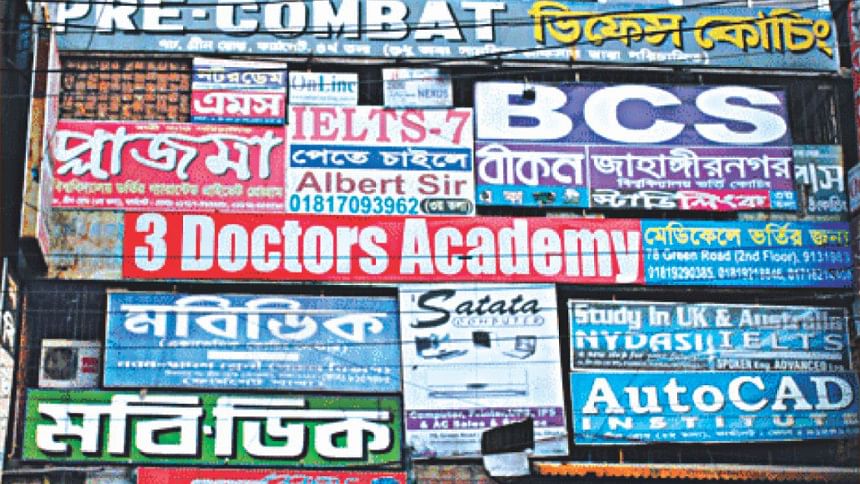Restraining Coaching business or teachers?

On 7 February 2019, the High Court Division (HCD) delivered a judgment on the legality of a policy promulgated by the Ministry of Education (MOE) in 2012 on limiting the involvement of teachers in the coaching business. Since the writer has not got hold of the full-text of the judgment, this write-up would not dwell primarily on the judgment; rather this write-up would instead concentrate on the recklessness of the policy and the way it has been sought to be enforced by the MOE and Anti-Corruption Commission (ACC). Indeed, it argues that this policy is an indication of the lack of a considered approach to education and a lack of respect and empathy towards teachers in this country.
First and foremost, the MOE has formulated this policy in response to a rule issued by the HCD in 2011, not a binding judgment. On a matter so fundamental as this, the MOE formulated a policy, which is, in effect applied like a law. It should ideally have been based on either a law passed by the Parliament or at least a delegated law on which there could have been a far greater scope of accommodating the inputs of various stakeholders. This is not to comment on the legality of the policy, but rather the wisdom of the way MOE has sought to enforce. It is also quite odd that on a policy like this, the assigned authorities did not appear to have consulted the educationalists. Oddly, the policy, in essence, is against teachers being engaged in coaching centres, not coaching centres operating their business.
If teachers of government educational institutes are restricted from teaching in formal coaching centres, they would still manage to teach in-house which would be next to impossible to stop. During our SSC and HSC days many of us were aware that while some of our teachers were involved in private tuition of students in batches, a few privileged students were receiving in-house private tuition for a whopping sum of money beyond the means of most. This kind of private tuition would remain untouched by the policy. And thus, it would only likely limit the choice of the students with modest financial means. Even in economically advanced countries (from personal experience, I can speak of Australia and Singapore), coaching is widespread.
The policy would do nothing to restrict coaching by teachers in private schools and many others such as students of universities and medical colleges. No one would morally support teachers being engaged in coaching ignoring their routine classes and other commitments in their respective educational institutions. However, when non-teacher government employees including civil servants are involved in teaching (of course, generally, after complying with their administrative formalities), it is grossly discriminatory that teachers in government educational institutions would be restricted from coaching.
It is hard to believe that coaching which is nothing, but a form of teaching for money beyond formal educational institutions is acceptable when it is done by non-teachers, and unacceptable when done by teachers. If coaching by teachers is a 'business', it is the same when it is done by other professionals. If the other professionals whose job description has nothing whatsoever to do with teaching can be involved in teaching without anybody questioning their professional integrity, by the same token, the career teachers, be in government or private educational institutions, should have every right to be engaged in teaching in whatever name it is labelled. If the comparatively far better-paid professionals have the financial need to earn extra bucks, the economic need of teachers cannot be doubted.
Again, as reported by media, the HCD has very rightly commented that the focus of the ACC on the low-profile violation of policy or law by teachers is rather curious. This is particularly so when we consider that ACC officials often lament the lack of resources at their disposal. The ACC would serve this country better if they focus their energy on other public sectors where the public perception is that they are rife in corruption and petty violation of law or policy by teachers should better be a lower level agenda for the ACC.
The effort to curb teachers teaching in coaching centres without enhancing the public expenditure on education and paying the teachers enough for a dignified life is not only misplaced but also immoral and would possibly be counter-productive. Already the lack of incentive of teachers is so low that often meritorious students are hard-pressed to enter teaching in schools and even colleges. It is a sad reality that many teachers at school level (and at times at college level too) are already virtually relegated to the near bottom of the social strata. And to push them further by restraining their option to be engaged in teaching beyond their educational institutions would be awful and would contribute little to suppress the 'business of coaching'.
THE WRITER IS AN ASSOCIATE PROFESSOR, DEPARTMENT OF LAW, NORTH SOUTH UNIVERSITY.

 For all latest news, follow The Daily Star's Google News channel.
For all latest news, follow The Daily Star's Google News channel. 



Comments